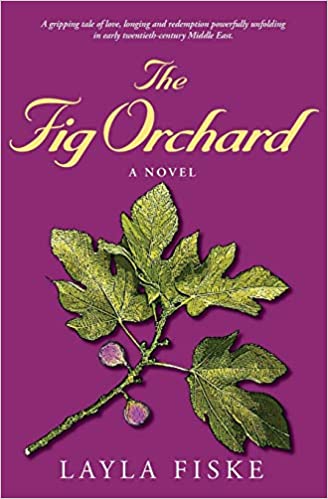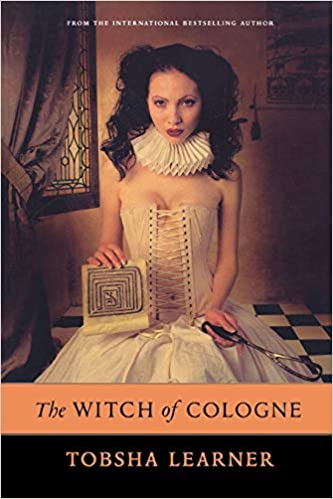Although natural births are making a comeback in the U.S. today, midwives have historically faced opposition for being as dangerously unprofessional, unhygienic, or just too “hippie.” However, midwives and doulas—birth workers without formal obstetric training—can often play crucial roles in forming female communities of power and support. Additionally, alternative birthing practices have deep roots in reproductive justice, with many midwives drawing upon indigenous practices and traditions. (If you’re looking for further reading on reproductive justice and women’s health advocacy, check out Efe Osaren’s list of books here.)
All this makes for rich literary fodder; the list of books below run the range of midwife narratives, addressing topics from legal battles to rural community drama, gristly birth descriptions to tender midwife-patient connections.
The Fig Orchard by Layla Fiske
A politically and emotionally complex saga centered on Nisrina Huniah, a Palestinian woman who turns to midwifery. Set in the Middle East right around WWI, The Fig Orchard paints a vivid historical portrait of one woman’s journey: when Nisrina’s beloved husband is kidnapped to serve in the Turkish army, she chooses to go to a Catholic university and study midwifery, so that she can support her children without re-marrying. Fiske’s debut novel is an exciting exploration of tradition, religion, and female agency.
The Birth House by Ami McKay
Rural midwives are often stereotyped as “backwards” or “old-fashioned,” but this Canadian bestseller shows that they can actually be feminist pioneers. Dora, the first daughter in five generations in the Rare family, finds herself as a midwife’s apprentice. When a new doctor threatens to shut down midwifery, Dora must decide if she wants to keep practicing. Set in a rural Nova Scotia village in the early 1900’s, McKay’s novel highlights the struggle for women’s rights, both in and out of the hospital room.
Listen to Me Good: the Life Story of an Alabaman Midwife by Margaret Charles Smith and Linda Janet Holmes
At age 91, Margaret Charles Smith was one of the oldest surviving traditional midwives in Alabama. Lay midwives like Smith were vital to the Black female community, drawing upon traditional knowledge and building a sense of solidarity. But in 1976, a state law condemned midwifery, causing many to lose their permits for the next five years. Published in 1996, this oral history documents Smith’s lifelong work of providing racially equitable healthcare for women, offering a view of the Civil Rights Movement from a rarely-seen angle.
Call the Midwife: A Memoir of Birth, Joy, and Hard Times by Jennifer Worth
Birthing is always messy—and fairly often fatal—in Worth’s memoir. In this first book of the Midwife Trilogy, Worth writes of her real-life experiences as a midwife in the slums of 1950s East London. Featuring a cast of deftly drawn, unforgettable characters—from the lovable nuns that she lives with to the prostitutes of poverty-stricken streets—the book vividly describes Worth’s female-centered community. If you’re a fan of period British shows (looking at you, Downton Abbey fans), check out the critically-acclaimed BBC show of the same name, which is an adaptation of Worth’s series.
Midwives by Chris Bohaljian
When a home birth goes fatally awry in rural Vermont, midwife Sibyl Danforth finds herself accused of manslaughter. That night unleashes a long court case, with doctors and attorneys that are only too happy to use Sibyl’s case to attack the midwifery profession. During the years following, Sibyl struggles to prove herself not guilty and, amidst the pressure, keep her family intact. If you’re looking for your next thriller, try Bohaljian’s tension-filled examination of human responsibility.
The Blue Cotton Gown: A Midwife’s Memoir by Patricia Harman
Patricia Harman runs a women’s health clinic in the Appalachian mountains of West Virginia; she works there as a midwife and manager, while her husband is the clinic’s ob-gyn doctor. Through her interactions with pregnant teenagers, abusive husbands, and transitioning patients, Harman shows the day-to-day life operations of midwifery. Meanwhile, she herself must deal with financial struggles and marital tensions. Focusing equally on individual midwife-patient connections and the larger logistics of operating a clinic, Harman intertwines both the professional and personal aspects of her life beautifully in her memoir.
Someone Knows My Name by Lawrence Hill
Hill’s emotionally wrenching novel is told from the perspective of Aminata Diallo, who was kidnapped from her hometown in West Africa and forced into slavery in South Carolina. Because of the midwifery skills she learned from her mother, Aminata is considered to be more useful. Set against the backdrop of the American Revolution, Someone Knows My Name shows Aminata constantly fighting for her own and others’ freedom.
The Witch of Cologne by Tobsha Learner
A historical drama that addresses forbidden love, mystical studies, and birthing babies in the 17th century? Add in the Spanish Inquisition and Jewish ghettos, and you’ve got The Witch of Cologne. Learner’s novel centers on Ruth, a fierce Jewish woman who is determined to practice kabbalah andmake a life for herself through midwifery skills. Through Ruth’s story, who faces torture for her religious practices and simultaneously falls in love with a Catholic churchman, Learner explores the ideas of faith and love.
Why Not Me?: The Story of Gladys Milton, Midwife by Wendy Bovard and Gladys Milton
This memoir begins in court, with the State of Florida Health and Rehabilitative Services vs. Gladys Milton. When Milton started practicing in rural Florida, many hospitals refused to serve Black and brown women; Milton was able to help by safely delivering thousands of babies. However, when the state medical agency unjustly asks her to “retire” or face charges, she must go to court to fight for her case. The struggle for reproductive rights and access to adequate healthcare rings only too true today, with a Supreme Court Justice nominee who could help overturn the Roe vs. Wade case.
Baby Catcher: Chronicles of a Modern Midwife by Peggy Vincent
This memoir talks about Vincent’s own journey from a nursing school student to midwife in the 1980s, and her experience with “catching” over 2000 babies. Vincent’s humorous prose and her details—from jealous pets to oven-warmed blankets—make this an intimate, page-turning read. And if you’re looking for another contemporary midwife memoir after Vincent’s, try Carol Leonard’s Lady’s Hands, Lion’s Heart.
The Midwife’s Confession by Diane Chamberlain
A midwife’s profession itself is based on bringing new life into the world. When a young midwife commits suicide, her friends are left struggling to make sense of her previous commitment to life with her abrupt and tragic death. In the wake of her death, they discover that Noelle, the midwife, has been hiding a shocking secret. Chamberlain’s page-turning thriller combines regret and hope, death and life to keep you reading late into the night.
Spiritual Midwifery by Ina May Gaskin
No book list on contemporary midwifery would be complete without this classic text, written by founder of the Farm Midwifery Center. Gaskin’s 1977 book was a radical departure from previous medical texts that treated birth only from a clinical, scientific perspective; Gaskin draws attention to the emotional and generative aspects of childbirth. She includes tales of amazing births she has witnessed, as well as including practical techniques, statistics, and resources for natural birth. Already read Spiritual Midwifery? Try Gaskin’s more recent publication, Birth Matters: A Midwife’s Manifesta.
The post 12 Books on How Midwives Are Changing Childbirth appeared first on Electric Literature.












Be First to Comment